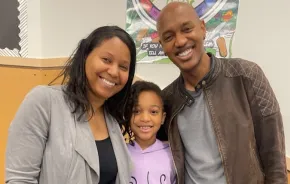Here are 10 tips from the National Information Center for Children and Youth with Disabilities:
Learn more about learning disabilities. Find out as much as you can about the problems your child has with learning, what types of learning tasks will be hard for your child, what sources of help are available, and what you can do to make life and learning easier for your child.
Become an unobtrusive detective. Look for clues that can tell you how your child learns best. Does he or she learn best through looking, listening or touching? What is your child's weakest approach to learning? Pay attention to his or her interests, talents and skills.
Teach through your child's areas of strength. For example, your child may have great difficulty reading information but readily understands when listening. Take advantage of that strength.
Respect and challenge your child's natural intelligence. Learning can take place in many ways. Most children with learning disabilities have average or above average intelligence that can be engaged and challenged through using a multisensory approach.
Remember that mistakes don't equal failure. Your child may have the tendency to see his or her mistakes as huge failures. You can model, through good-humored acceptance of your own mistakes, that mistakes can be useful. They can lead to new solutions.
Recognize that there may be some things your child won't be able to do or will have lifelong trouble doing. Help your child to understand that this doesn't mean he or she is a failure. After all, everyone has something they can't do.
Capitalize on the things your child can do. Be aware that struggling with your child over reading, writing and homework can draw you into an adversarial position with your child. The two of you will end up angry and frustrated with each other, sending the message to your child that he or she has failed. You can contribute positively to your child's schooling by participating in the development of your child's individualized education program (IEP) and by sharing with the school the special insights about your child.
Use television creatively. Television or videos can be a good medium for learning. You can augment learning by asking questions about what was seen. What happened first? Then what happened? How did the story end?
Make sure books are at your child's reading level. Most children with learning disabilities read below grade level. For children to experience success at reading, it's important that they have books to read that are on their reading level. Foster reading by finding books on topics of interest to your child, or by reading aloud. Also let your kids select their own books to read.
Encourage your child to develop his or her special talent. What is your child good at? What does she or he especially enjoy? Encouraging your child to pursue areas of talent lets him or her experience success and a place to shine.









